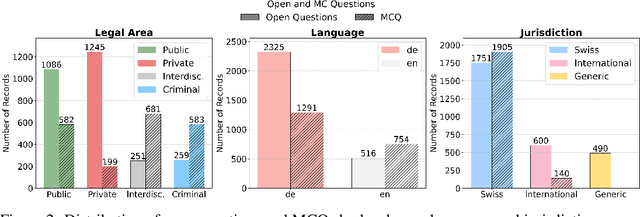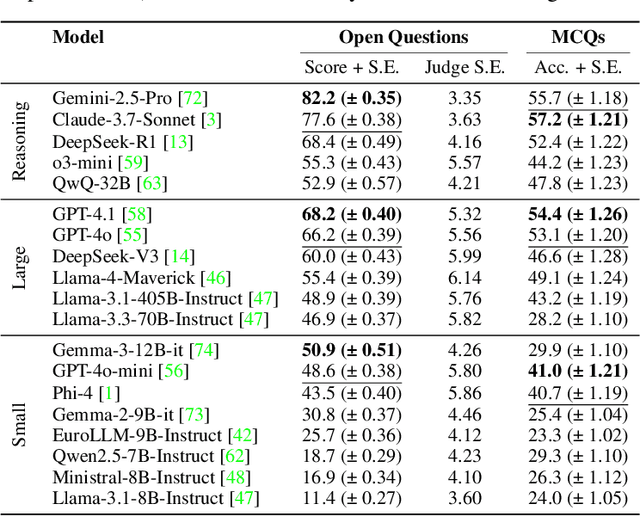Elliott Ash
pdfQA: Diverse, Challenging, and Realistic Question Answering over PDFs
Jan 06, 2026Abstract:PDFs are the second-most used document type on the internet (after HTML). Yet, existing QA datasets commonly start from text sources or only address specific domains. In this paper, we present pdfQA, a multi-domain 2K human-annotated (real-pdfQA) and 2K synthetic dataset (syn-pdfQA) differentiating QA pairs in ten complexity dimensions (e.g., file type, source modality, source position, answer type). We apply and evaluate quality and difficulty filters on both datasets, obtaining valid and challenging QA pairs. We answer the questions with open-source LLMs, revealing existing challenges that correlate with our complexity dimensions. pdfQA presents a basis for end-to-end QA pipeline evaluation, testing diverse skill sets and local optimizations (e.g., in information retrieval or parsing).
Reasoning with Confidence: Efficient Verification of LLM Reasoning Steps via Uncertainty Heads
Nov 11, 2025Abstract:Solving complex tasks usually requires LLMs to generate long multi-step reasoning chains. Previous work has shown that verifying the correctness of individual reasoning steps can further improve the performance and efficiency of LLMs on such tasks and enhance solution interpretability. However, existing verification approaches, such as Process Reward Models (PRMs), are either computationally expensive, limited to specific domains, or require large-scale human or model-generated annotations. Thus, we propose a lightweight alternative for step-level reasoning verification based on data-driven uncertainty scores. We train transformer-based uncertainty quantification heads (UHeads) that use the internal states of a frozen LLM to estimate the uncertainty of its reasoning steps during generation. The approach is fully automatic: target labels are generated either by another larger LLM (e.g., DeepSeek R1) or in a self-supervised manner by the original model itself. UHeads are both effective and lightweight, containing less than 10M parameters. Across multiple domains, including mathematics, planning, and general knowledge question answering, they match or even surpass the performance of PRMs that are up to 810x larger. Our findings suggest that the internal states of LLMs encode their uncertainty and can serve as reliable signals for reasoning verification, offering a promising direction toward scalable and generalizable introspective LLMs.
Apertus: Democratizing Open and Compliant LLMs for Global Language Environments
Sep 17, 2025



Abstract:We present Apertus, a fully open suite of large language models (LLMs) designed to address two systemic shortcomings in today's open model ecosystem: data compliance and multilingual representation. Unlike many prior models that release weights without reproducible data pipelines or regard for content-owner rights, Apertus models are pretrained exclusively on openly available data, retroactively respecting robots.txt exclusions and filtering for non-permissive, toxic, and personally identifiable content. To mitigate risks of memorization, we adopt the Goldfish objective during pretraining, strongly suppressing verbatim recall of data while retaining downstream task performance. The Apertus models also expand multilingual coverage, training on 15T tokens from over 1800 languages, with ~40% of pretraining data allocated to non-English content. Released at 8B and 70B scales, Apertus approaches state-of-the-art results among fully open models on multilingual benchmarks, rivalling or surpassing open-weight counterparts. Beyond model weights, we release all scientific artifacts from our development cycle with a permissive license, including data preparation scripts, checkpoints, evaluation suites, and training code, enabling transparent audit and extension.
The Medium Is Not the Message: Deconfounding Text Embeddings via Linear Concept Erasure
Jul 01, 2025Abstract:Embedding-based similarity metrics between text sequences can be influenced not just by the content dimensions we most care about, but can also be biased by spurious attributes like the text's source or language. These document confounders cause problems for many applications, but especially those that need to pool texts from different corpora. This paper shows that a debiasing algorithm that removes information about observed confounders from the encoder representations substantially reduces these biases at a minimal computational cost. Document similarity and clustering metrics improve across every embedding variant and task we evaluate -- often dramatically. Interestingly, performance on out-of-distribution benchmarks is not impacted, indicating that the embeddings are not otherwise degraded.
Can Large Language Models Capture Human Annotator Disagreements?
Jun 24, 2025Abstract:Human annotation variation (i.e., annotation disagreements) is common in NLP and often reflects important information such as task subjectivity and sample ambiguity. While Large Language Models (LLMs) are increasingly used for automatic annotation to reduce human effort, their evaluation often focuses on predicting the majority-voted "ground truth" labels. It is still unclear, however, whether these models also capture informative human annotation variation. Our work addresses this gap by extensively evaluating LLMs' ability to predict annotation disagreements without access to repeated human labels. Our results show that LLMs struggle with modeling disagreements, which can be overlooked by majority label-based evaluations. Notably, while RLVR-style (Reinforcement learning with verifiable rewards) reasoning generally boosts LLM performance, it degrades performance in disagreement prediction. Our findings highlight the critical need for evaluating and improving LLM annotators in disagreement modeling. Code and data at https://github.com/EdisonNi-hku/Disagreement_Prediction.
LEXam: Benchmarking Legal Reasoning on 340 Law Exams
May 19, 2025



Abstract:Long-form legal reasoning remains a key challenge for large language models (LLMs) in spite of recent advances in test-time scaling. We introduce LEXam, a novel benchmark derived from 340 law exams spanning 116 law school courses across a range of subjects and degree levels. The dataset comprises 4,886 law exam questions in English and German, including 2,841 long-form, open-ended questions and 2,045 multiple-choice questions. Besides reference answers, the open questions are also accompanied by explicit guidance outlining the expected legal reasoning approach such as issue spotting, rule recall, or rule application. Our evaluation on both open-ended and multiple-choice questions present significant challenges for current LLMs; in particular, they notably struggle with open questions that require structured, multi-step legal reasoning. Moreover, our results underscore the effectiveness of the dataset in differentiating between models with varying capabilities. Adopting an LLM-as-a-Judge paradigm with rigorous human expert validation, we demonstrate how model-generated reasoning steps can be evaluated consistently and accurately. Our evaluation setup provides a scalable method to assess legal reasoning quality beyond simple accuracy metrics. Project page: https://lexam-benchmark.github.io/
Navigating the Helpfulness-Truthfulness Trade-Off with Uncertainty-Aware Instruction Fine-Tuning
Feb 17, 2025Abstract:Instruction Fine-tuning (IFT) can enhance the helpfulness of Large Language Models (LLMs), but it may lower their truthfulness. This trade-off arises because IFT steers LLMs to generate responses with long-tail knowledge that is not well covered during pre-training, leading to more informative but less truthful answers when generalizing to unseen tasks. In this paper, we empirically demonstrate this helpfulness-truthfulness trade-off in IFT and propose $\textbf{UNIT}$, a novel IFT paradigm to address it. UNIT teaches LLMs to recognize their uncertainty and explicitly reflect it at the end of their responses. Experimental results show that UNIT-tuned models maintain their helpfulness while distinguishing between certain and uncertain claims, thereby reducing hallucinations.
DIRAS: Efficient LLM-Assisted Annotation of Document Relevance in Retrieval Augmented Generation
Jun 20, 2024



Abstract:Retrieval Augmented Generation (RAG) is widely employed to ground responses to queries on domain-specific documents. But do RAG implementations leave out important information or excessively include irrelevant information? To allay these concerns, it is necessary to annotate domain-specific benchmarks to evaluate information retrieval (IR) performance, as relevance definitions vary across queries and domains. Furthermore, such benchmarks should be cost-efficiently annotated to avoid annotation selection bias. In this paper, we propose DIRAS (Domain-specific Information Retrieval Annotation with Scalability), a manual-annotation-free schema that fine-tunes open-sourced LLMs to annotate relevance labels with calibrated relevance probabilities. Extensive evaluation shows that DIRAS fine-tuned models achieve GPT-4-level performance on annotating and ranking unseen (query, document) pairs, and is helpful for real-world RAG development.
Aligning Large Language Models with Diverse Political Viewpoints
Jun 20, 2024Abstract:Large language models such as ChatGPT often exhibit striking political biases. If users query them about political information, they might take a normative stance and reinforce such biases. To overcome this, we align LLMs with diverse political viewpoints from 100,000 comments written by candidates running for national parliament in Switzerland. Such aligned models are able to generate more accurate political viewpoints from Swiss parties compared to commercial models such as ChatGPT. We also propose a procedure to generate balanced overviews from multiple viewpoints using such models.
Whose Preferences? Differences in Fairness Preferences and Their Impact on the Fairness of AI Utilizing Human Feedback
Jun 09, 2024



Abstract:There is a growing body of work on learning from human feedback to align various aspects of machine learning systems with human values and preferences. We consider the setting of fairness in content moderation, in which human feedback is used to determine how two comments -- referencing different sensitive attribute groups -- should be treated in comparison to one another. With a novel dataset collected from Prolific and MTurk, we find significant gaps in fairness preferences depending on the race, age, political stance, educational level, and LGBTQ+ identity of annotators. We also demonstrate that demographics mentioned in text have a strong influence on how users perceive individual fairness in moderation. Further, we find that differences also exist in downstream classifiers trained to predict human preferences. Finally, we observe that an ensemble, giving equal weight to classifiers trained on annotations from different demographics, performs better for different demographic intersections; compared to a single classifier that gives equal weight to each annotation.
 Add to Chrome
Add to Chrome Add to Firefox
Add to Firefox Add to Edge
Add to Edge